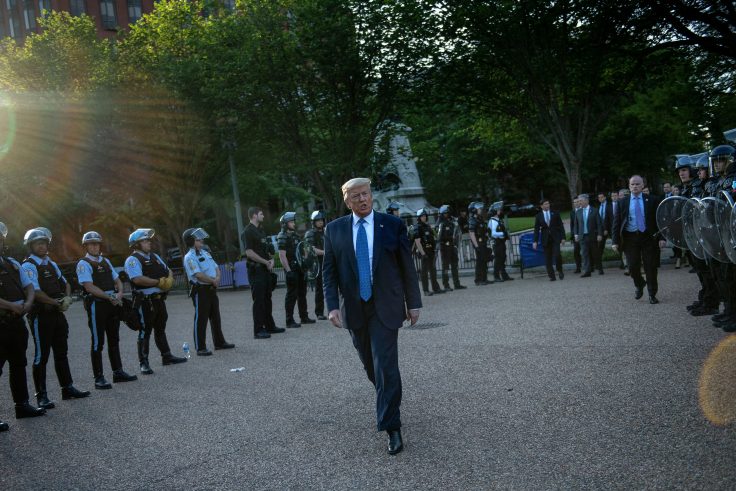The Biden administration is invoking a controversial legal tool loathed by progressive activists to defend the officers who cleared Lafayette Square during the 2020 George Floyd riots, one of the most memorable moments of the Trump presidency.
Then-candidate Joe Biden denounced the event, and former president Donald Trump’s subsequent visit to St. John’s Episcopal Church, as un-American. Now, Justice Department lawyers claim the officers are covered by qualified immunity, a legal shield that protects law enforcement from most lawsuits while they’re on the job.
The government defends officers facing lawsuits for misconduct in most cases. But President Joe Biden backs legislation that would eliminate qualified immunity for law enforcement altogether. That puts the Justice Department’s position in tension with the Democratic police reform agenda, as well as the president’s past comments.
The plaintiffs, represented by the ACLU, are the DC chapter of Black Lives Matter and seven demonstrators who were on hand when federal agents and local police cleared the square ahead of Trump’s appearance. They claim the defendant officers, all members of the U.S. Park Police, "rushed forward and attacked the assembled protesters without warning or provocation."
Speaking from the campaign trail in 2020, Biden denounced the events in the square. "This is a nation of values. Our freedom to speak is a cherished knowledge that lives inside every American, almost from the time you’re a kid," Biden said. "We’re not allowing any president to quiet our voice."
Leading newspapers were similarly scathing. The editorial board of the Washington Post called the U.S. Park Police officers involved "shock troops" and announced the agency’s reputation was in tatters, while opinion leaders at the New York Times put the officers on the wrong side of the First Amendment.
In a September 2020 filing, the plaintiffs allege that one of the defendants beat a foreign news correspondent with his baton. Another allegedly "leaned his weight behind his shield and bashed" a demonstrator.
Justice Department lawyers put things in a different light, emphasizing in counter-filings that the officers' actions followed days of unrest and mass lawbreaking around the White House complex. On the law, they say the plaintiffs have no claim because the officers were protecting the president, a vital national interest.
Lawsuits against federal law enforcement for violations of constitutional rights can only go forward under very specific circumstances. The Justice Department argues those circumstances don’t cover the Lafayette Square incident. While courts have sometimes expanded those narrow parameters, DOJ says opening the door to lawsuits in the context of presidential protection is a bad idea.
"The court should be especially wary before minting a new damages remedy that might chill officers who comprise the first line of defense (and who face the risk of personal injury) in circumstances that involve presidential security," DOJ lawyers wrote in legal papers.
As an alternative argument, department lawyers said the officers are entitled to qualified immunity. Abolishing qualified immunity is a top priority of reform-minded activists who say it functionally operates as an absolute shield for law enforcement, even in cases of obvious misconduct.
Overcoming qualified immunity is a tall order. A plaintiff has to show an officer violated "clearly established law," which means they must point to an earlier decision with near-identical facts that makes clear the misconduct alleged in their case is indeed unlawful. That bar is usually too high for plaintiffs to clear.
The George Floyd Justice in Policing Act, a police reform bill House Democrats passed in March, would abrogate qualified immunity if it becomes law. President Biden supports the bill, which faces uncertain odds in the Senate. He urged the Upper Chamber to pass it by May 25, the one year anniversary of Floyd’s death, during a joint address to Congress in April.
A motion to dismiss claims against Trump, former attorney general William Barr, former defense secretary Mark Esper, and other senior officials is pending separately. If the court denies the motion, the Justice Department will have to decide whether to continue to defend the former president and his confidants. Legal papers for the Trump-Barr motion to dismiss were submitted before Biden took office.
The Department of Justice declined to comment for this story. The ACLU of Washington, D.C., was not able to return a request for comment.
The case is Black Lives Matter DC v. Biden in the U.S. District Court for the District of Columbia.
